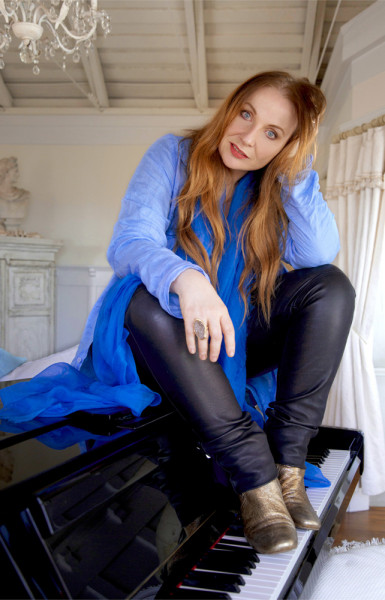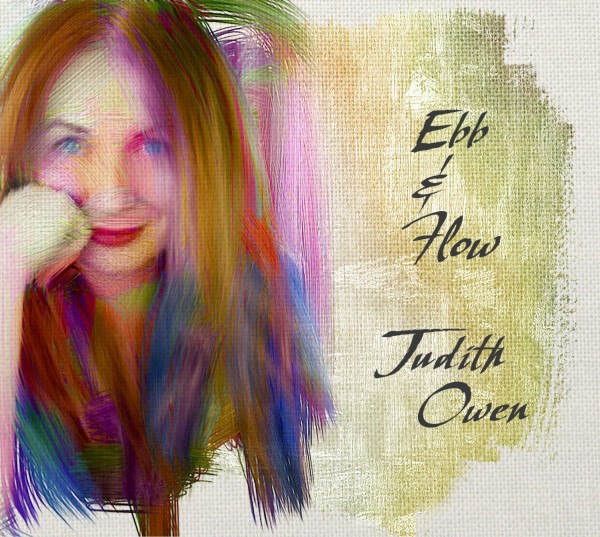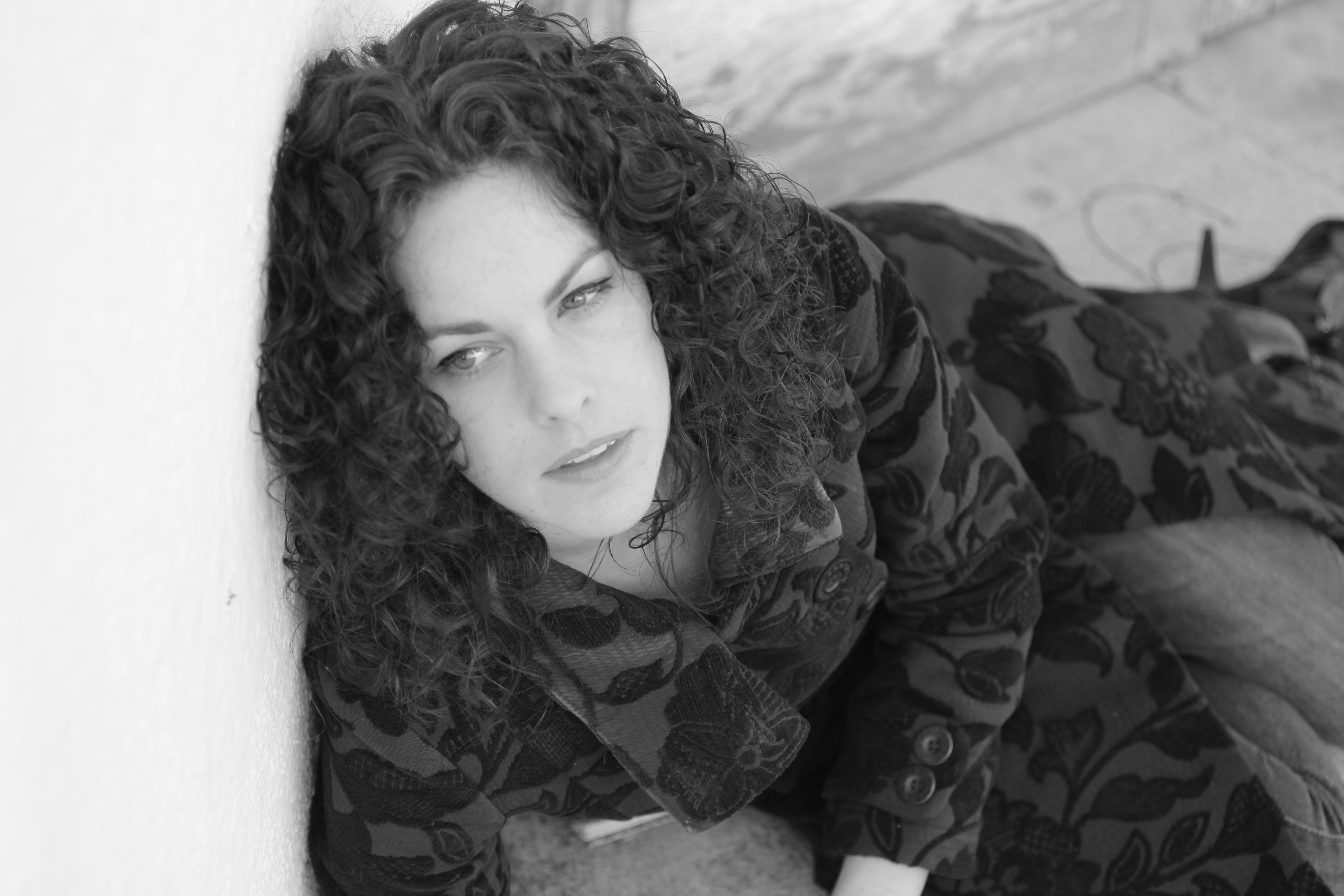A CHAT WITH: JUDITH OWEN
aaamusic | On 22, Apr 2014
Welsh singer, songwriter and pianist Judith Owen has been a regular musical partner to Richard Thompson and straight woman to Ruby Wax in their odd fringe theatre twin act. She’s married to the actor and humorist Harry Shearer. Interviewer Anthony Weightman chatted to her about her new album Ebb & Flow at Julie’s Restaurant in London where “great names from rock and roll, high society and Hollywood are still passing through their doors.”
Anthony Weightman: After I listened to Ebb & Flow for the first time, I then realised what an apt title it was. It had natural movements and rhythms which were intense one moment and relaxed the next. You explored various emotional themes that came and went: dreams, loss, joy, love, pain, hope, sadness and loneliness. Were you happy with your choice of title?
Judith Owen: Yes, absolutely. I’d done a record called The Beautiful Damage, again an intonation of how I see life and what I write about and how I feel everything is. Exquisitely beautiful one minute and awful the next. That’s what life is. It literally ‘ebbs and flows.’ After I’d done the photo shoot with a wild life photographer I wanted something real and live. We did it at the beach in L.A.. I am very connected with the sea which I feel calmed and humbled by. It puts you in your place. You realise how gigantic it all is and you are nothing. It’s very important to have those feelings. Life and my songs are bitter sweet. The music may be disarmingly or distractingly beautiful. There is always that double edge to songs. They’re meant to entertain, but they are emotionally intelligent. They pack a bit of a wallop if you want to go that deeply into them. If you just want to enjoy the song and sing to the melody, that’s great too. Ebb & Flow just sums up my life today. Life is like that. It’s tidal.
Anthony Weightman: That’s my experience too. Could I ask how you feel your new album has been received? I know that one review has said there wasn’t much sense of deja vu, but personally I don’t agree. I felt that it was recapturing the feel of some of best music of the seventies.
Judith Owen: Well, I don’t ever read things about myself. I think it’s a real danger. I like the fact that most reviewers have said that it’s a love letter and harping back to another time. I’m not imitating the seventies. I’m not pretending to do that. I don’t want to do that. I want to garner these beautiful musicians that I sang along to as a child. I loved them so dearly and they meant so much to me. When my Dad died a couple of years ago I figured there was something important I should do. The next project should be really splendid, cathartic and wonderful. To work with those who’ve influenced my writing and style and who I’ve heard in my head all the time while I’ve been writing songs. I can’t be anyone else in the midst of it. I can’t pretend to be anyone else. I wasn’t after a re-hash, I was after their sensibilities. Those guys cut their teeth on the kind of music that I write. That’s what I wanted. That beautiful compassion, empathy and the skill that they’ve always brought to music.
Anthony Weightman: I loved ‘I Would Give Anything’ as a song. I lost my own father recently, so I could relate to the lingering photographs and the empty rooms. Patty Griffin’s country song ‘Go Wherever You Want To Go’, about the passing of her father, is a little different because it touches on immortality as a subject. Do you have a view on immortality?
Judith Owen: I don’t know if there’s immortality. I don’t know if my Dad’s somewhere else. I believe that, like everybody else, he’s gone into the cosmos as a molecule. We go and we make something else. It would be lovely if there was immortality. I don’t deal with hoping. I deal with the hard truths. In the song I’m just talking about humanity in the here and now.
Anthony Weightman: In ‘Train Out Of Hollywood’ you touch upon the pursuit of fame. Lauren Bacall was famous for saying “Stardom isn’t a profession. It’s an accident”. Do you think that there will always be some highly talented musicians who will never receive the recognition they deserve?
Judith Owen: Yes, I do. By that you mean me?
Anthony Weightman: No, I wasn’t referring to you, actually.
Judith Owen: Oh you weren’t! Well, I love that about you. I’m always surprised and amazed by how many people know me and are my fans. It’s a very strange occupation. Let me just speak for myself. A lot of us are bottomless pits of need who go into this because we’re not functioning correctly as human beings. We’re not healthy in that way, emotionally. It makes for great art. It makes for tremendous performers and it makes for people who are constantly yearning for love and appreciation. Even when you’re at the top of your game and you’re the most successful person in the world, that doesn’t mean you’re happy. The chances are you won’t be. When you’re on stage and you have 20,000 people adoring you, you might for a split second be happy, but you’ll go home and think you’re a piece of shit. When James Taylor was at the height of his fame he was played everywhere and anywhere. When he was exploding onto the scene and adored he wrote ‘Train Out Of Hollywood.’ Every time he heard himself he became more and more depressed. It made him ill to hear himself because he was so full of self loathing. So, being adored by an audience doesn’t fill you up. That comes from the inside out, not the outside in. That’s what the song is about. I write about my problems and struggles and about when I see them in someone else. So, when I went to L.A. and discovered how desperate everybody was and how ‘on’ they were to create an impression, I didn’t find it loathsome and awful because I have great empathy. I understand and have compassion for people who, like me, think that if they get applause and people buy their records, they might feel good about themselves. That’s the true sadness. You’ll get that momentary OK feeling and then it just goes. Music is my therapy.
Anthony Weightman: Last summer I was walking through a tiny Cornish fishing village in idyllic weather and, quite by chance, a friend of mine introduced me to someone having fun pushing out a canoe. It was actually Raymond Dorset who wrote ‘In The Summertime’. It’s now sold about thirty million copies. Did you just feel this was a wonderfully cheerful and playful summer song to give contrast to the more serious songs on the album?
Judith Owen: I’d already finished recording the record and I was doing a summer show in London. I love covering songs like ‘Smoke On The Water.’The more testosterone, the more I like them. I can then turn them into something female and have a different take on them. ‘In The Summertime’ is a wonderful summer song. It’s everything we love about summer. We’re not in grey any more. Let’s take our clothes off. The British get happy.
I was in that Laurel Canyon frame of mind. I thought about what Joni would do. How do you change young boys wanting to get drunk and shag? How do you change that into something female and emotionally intelligent? You turn it into a more
seductive rhythm and sing about it. It has to be yours. You have to own it. There’s no point in doing a cover and sounding exactly the same. What if it’s about a woman who’s looking at the boys of summer and lusting after them? Summer to women means looking at these gorgeous creatures. Turn it around and it becomes something very different.
Anthony Weightman: When you wrote ‘You’re Not Her Any More’, about your mother’s suicide when you were 15, was this particularly difficult to do? I ask this out of personal curiosity because, when I was a teenager, I tried to discuss a suicide in the history of my own family and relatives were very reluctant to talk about it. I felt the subject was taboo.
Judith Owen: I couldn’t write that song until fifteen years later because nobody spoke about it in my family. You couldn’t. In Britain that’s the way we get over things. We push them down and my Mother’s the reason why I sing. My Father’s the reason why I can. That’s what they mean to me. Suicide is an awful thing. All mental illness is a terrible thing because it’s a life of secrecy, shame and guilt. No one wants to speak about it because it’s too overwhelming. The truth that lies underneath is too shocking for anyone to grasp. What we should have done. What we could have done. What we didn’t do. Why would this person leave their husband and their children? It’s shocking and terrifying. It’s the reason I became so ill and went off the rails myself. The relief of finally talking about this I still can’t describe. The song is about a denial of the family around. You can almost pretend it never happened. I was flying home to London for Christmas and in the air it hit me that I would never see my mother again.
Anthony Weightman: You’ve said that “any comparison to Joni Mitchell is every female singers dream”, but, I suppose there were uncertain periods in her career. Her experimentation with folk jazz in her mid period album Hejira was not liked by some fans, even though it eventually became a contemporary classic. But, as you evolve as an artist, do you think that dealing with these sort of temporary setbacks just goes with the territory?
Judith Owen: Yes. I don’t really think about myself. I hope people like it and the critics like it. Not all fans are going to like what you do. You can only be the artist that you are and you have to follow your instincts and your path. Sometimes you hit a bullseye and sometimes you screw up and that’s just the nature of it. Anyone else wouldn’t be so under the microscope. That record became a classic later. I remember when her Both Sides Now album with orchestra came out and a few critics slammed it. I was listening thinking it was absolutely extraordinary work. Wait long enough and it’s hailed as a classic. Someone like Joni Mitchell has had a chequered career and is a true artist. She takes risks. For god or bad, that’s what they’re meant to do.
Anthony Weightman: Carole King‘s Tapestry remained the best selling female artist album for a quarter of a century. She was much loved for those very honest, intimate and personal songs. Why do you feel she was so extraordinarily successful?
Judith Owen: Because great songs are great songs. Especially now, in a ‘song light’ music scene, when you hear her songs it’s like going back to the great American songbook, like George Gershwin or Cole Porter or any other truly amazing songwriter who wrote classics. I think she’s a profoundly amazing writer. That record in particular is ‘the’ Carol King record.
Anthony Weightman: Do you feel that simplicity is an important key to success, even for singers and pianists whose music is described as ‘complex’ or ‘sophisticated’. For example, if you look at Tania Maria, the ‘queen of Latin jazz’, described as wild,fiery and explosive, the song considered her anthem, ‘Come With Me’, is probably her simplest one.
Judith Owen: Using Joni Mitchell as a comparison, ‘Big Yellow Taxi’ will continue to be her best known song. It’s simple, fun, wonderful, joyous and everyone can sing along to it. What it did for her is like the bait on the end of the fishing rod that brought the masses in. In the case of Adele she writes really simple and strong songs. If you love complexity, then you need simplicity if you want to reach the greater market. Things that sound simple but actually aren’t are my favourite. Things that sound effortlessly simple have often had a lot of thought behind them.
Anthony Weightman: Your origin was Wales. Do you feel that there are unusual natural places in Wales that are hugely inspirational for a musician? Personally, I’ve climbed the mountain and walked through the archway of flowers to the isolated cottage Bron-Y-Aur, where Led Zeppelin wrote some of their classic numbers like ‘Since I’ve Been Loving You’. There is something special about that place.
Judith Owen: It’s really interesting. I see myself as a London Welsh woman. The indoor market at Llanelli has meaning to me as a child, but nobody would want to write a song about it. The part of Wales that’s important to me is the part that I carry inside me. A constant yearning for something that doesn’t really exist. There are amazing American folk songs about people with yearning who are homesick. People who’ve left their homes and travelled thousands of miles.
Anthony Weightman: Listening to ‘You Are Not My Friend’ I had another of those deja vu moments. The theme reminded me of ‘Put It There, Pal’, Richard Thompson’s cynical song about a friendship which is not sincere or genuine, but a rather distant and manipulative relationship. Personally, I love both songs. Are we likely to see you touring with Richard Thompson again?
Judith Owen: Wouldn’t that be lovely. I’ve been on so many of his records now. 1000Years Of Popular Music and Cabaret of Souls, which I think is one of his greatest works. Richard is such a great friend. The best thing about being signed to Capitol Records was meeting Richard Thompson. Meeting Richard was one of the great joys of my life. I’m always thrilled when I get to spend any time with him. He’s not just a great writer, artist and performer. He’s really something quite triumphant on stage. He’s really so special. He’s one of the most fun people to be around that I’ve ever met. His ability to poke fun at all sorts of people is one of his many skills. He’s a real Brit but he’s able to laugh and find humour in all of us.
Anthony Weightman: I’ve been in the audience singing ‘Meet On The Ledge’ with him at the Cropredy Festival in the pouring rain at midnight. With ‘The Rain God.’
Judith Owen: ‘The Rain God’. Isn’t that just perfect!
Anthony Weightman: When I chat to people interested in music the subject of Sandy Denny often enters the conversation. Richard Thompson contributed comments to her biography. I once talked to Thea Gilmore who was initially ‘terrified’ at the idea of writing songs to lyrics that Sandy Denny had left behind on scraps of paper. Would you ever consider an album of songs which would recapture the feel of Sandy Denny?
Judith Owen: That’s a very nice idea. I’ll be honest with you. I don’t know anything about Sandy Denny other than via Richard. This is not my area of expertise or my era, but boy she was brilliant! Exquisitely beautiful. I didn’t go into singing with Richard thinking that his fans would compare me with Sandy Denny. Maybe I wouldn’t have been so relaxed and enjoyed myself so much. The reaction to it was fantastic. Sandy’s voice was so unbelievably gorgeous, pure, clear and honest. You’re making me want to go and listen to her songs. Divine pieces of music are rare things. Nice idea though. You’ve got me thinking.
Author: Anthony Weightman





